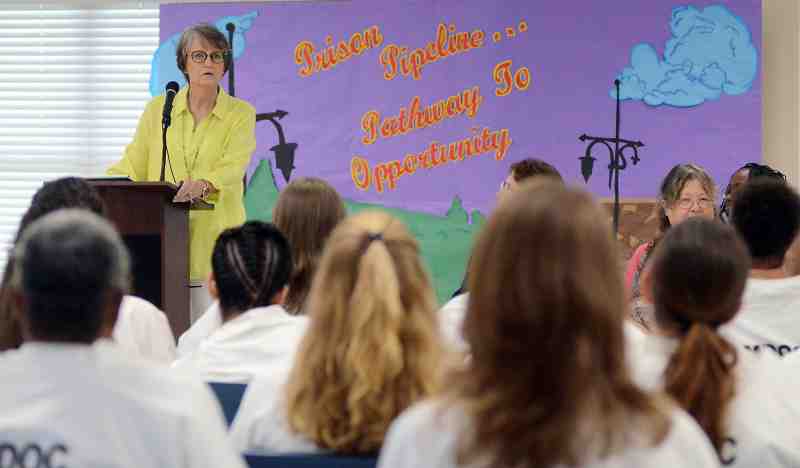Serving Mississippi’s Prison-To-College Pipeline Program

Mignon Kucia is elated to be part of a program helping Mississippi incarcerated men and women earn college credits.
“The opportunity to work with this program is a gift,” says Kucia, a Mississippi College communication professor. “The students I had the opportunity to teach were some of the hardest workers I have ever taught.”
The MC educator teaches classes with the Prison-To-College Pipeline Program. The Mississippi Department of Corrections initiative helps rehabilitate incarcerated men and women with college courses opening doors for success in the real world.
“Their desire to learn and their willingness to work hard – mostly without access to computers – cemented in my mind the need for this program,” Kucia said.
The Clinton resident attended an August graduation ceremony for women taking the classes at the Central Mississippi Correctional Facility in Rankin County.
Now in its fourth year, the program remains one of several the Mississippi Department of Corrections utilizes to assist men and women during and after incarceration.
It reaps benefits from a solid partnership. It involves the agency and schools including MC, the University of Mississippi, Millsaps College, and Jackson State University along with the Mississippi Humanities Council.
Last September, one prisoner noted the classes would assist her with plans for an upholstery business following her release. Instructors taught her, she said, the value of responsibility for her life.
Students taking the courses must possess a high school diploma or GED. Classes include American history, communication and American literature. Men and women can receive college credit.
Professors Otis Pickett of Mississippi College and Patrick Alexander at Ole Miss started the program at the Mississippi State Penitentiary at Parchman in 2014. There were 17 male incarcerated learners graduating at the first program in the Delta. The initiative expanded to the Central Mississippi Correctional Facility near Pearl in 2016 with 18 women taking classes.
An MC history professor, Pickett looks forward to serving more people inside prison walls.
The Clinton resident appreciates officials at Parchman and the Central Mississippi Correctional Facility for allowing college teachers to offer the courses. “My greatest thanks goes out to the students whose hard work in the most difficult of situations proves what the human spirit is capable of.”
Pickett and Alexander are thrilled by the program’s growth the past four years. “Mississippi College has played a tremendous role in that process as MC was the first school to offer college credit to graduates of the program.”
Mississippi College, Pickett said, has been a launching pad for the program’s expansion to the Central Mississippi Correctional Facility.
Instructors at the Prison-To-College Pipeline come from six colleges and universities in the Magnolia State.
MC, Ole Miss, and the Mississippi Humanities Council deserve thanks for their work to support the program, Pickett said.
Part of the mission of the Baptist-affiliated university in Clinton is to serve the community through various learning opportunities and cultural enrichment experiences. “We feel like the Prison to College Pipeline Program is a great example of how our faculty and staff work so hard to make this mission statement a reality.”
Sign-up For Our Newsletter
Get the latest news about Mississippi College delivered right to your inbox by subscribing to the Along College Street e-newsletter.


